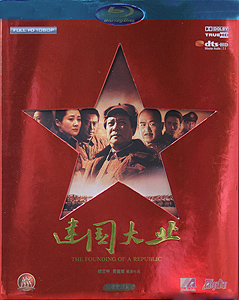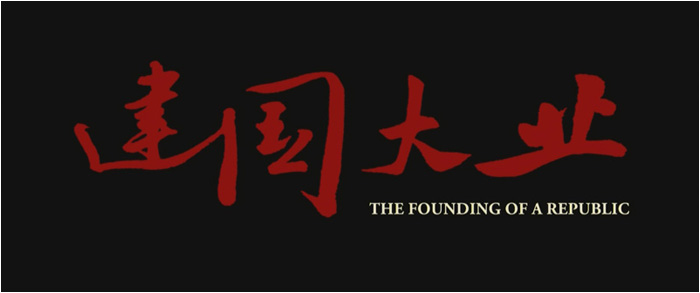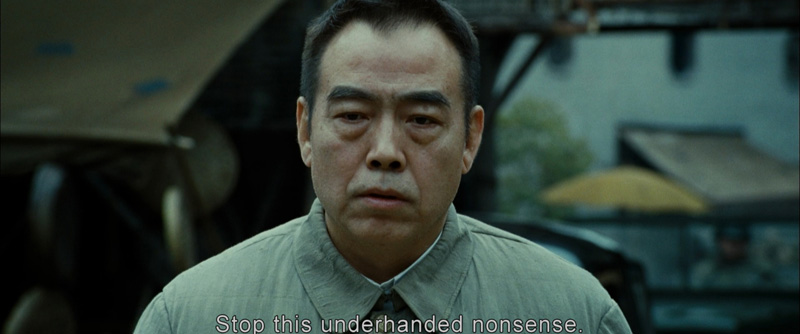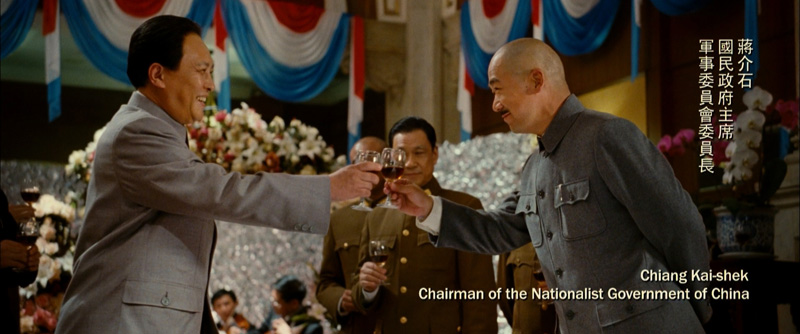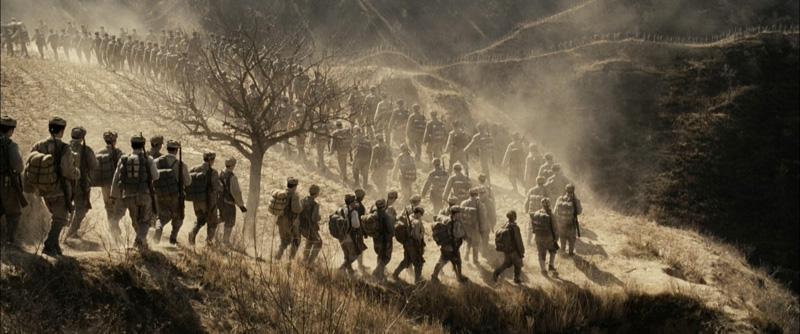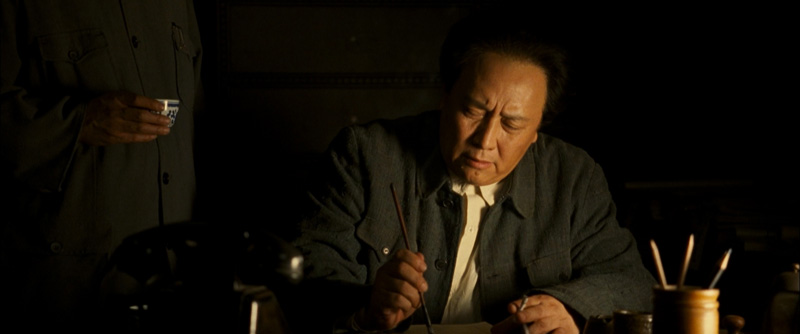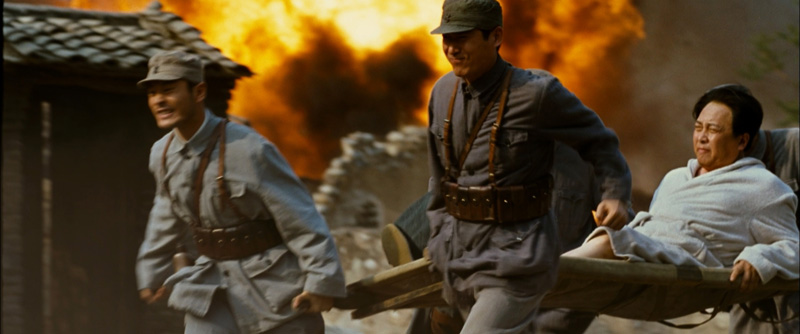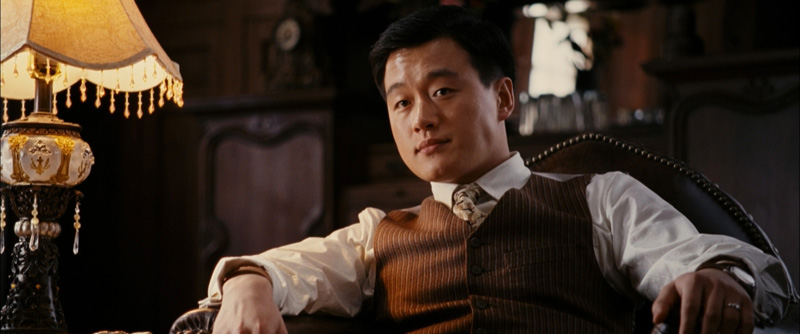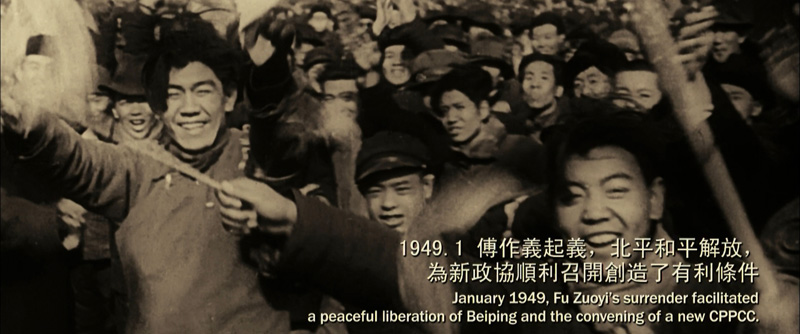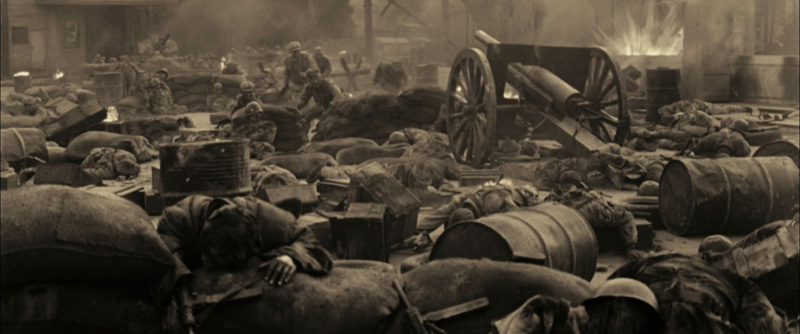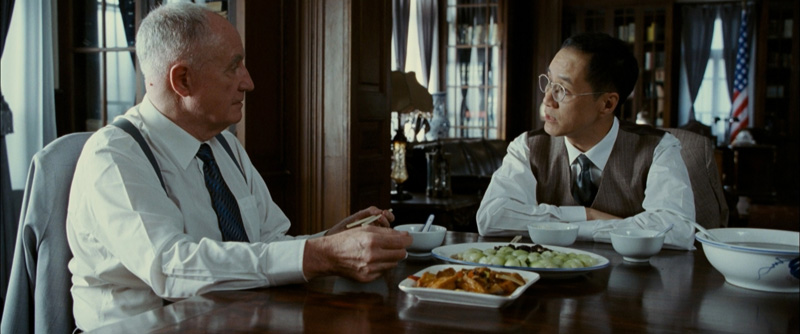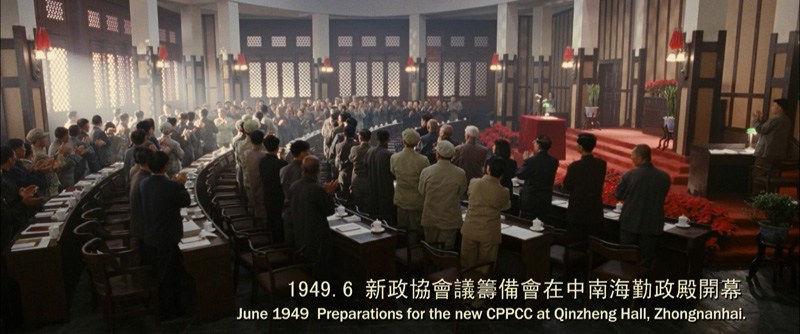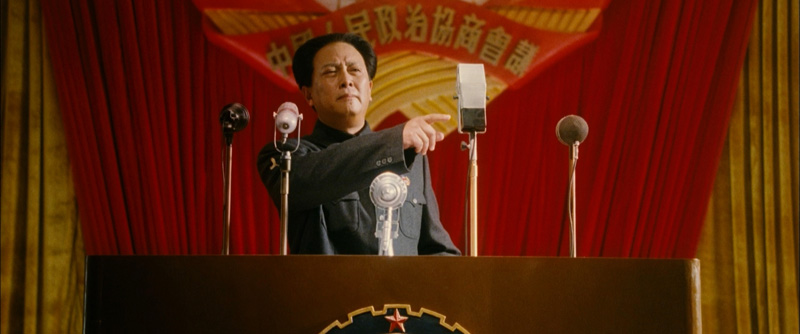Review by Leonard Norwitz
Blu-ray: MegaStar (Hong Kong)
Disc:
Region: FREE!
(as verified by the
Momitsu region FREE Blu-ray player)
Runtime: 2:20:57.750
Disc Size: 44,721,887,347 bytes
Feature Size: 40,360,378,368 bytes
Video Bitrate: 27.97 Mbps
Chapters: 20
Case: European hard plastic case Blu-ray case w / flip page
& slipcover
Release date: December 9th, 2009
Video:
Aspect ratio: 2.35:1
Resolution: 1080p / 24 fps
Video codec: MPEG-4 AVC Video
Audio:
DTS-HD Master Audio Chinese 2758 kbps 7.1 / 48 kHz / 2758
kbps / 16-bit (DTS Core: 5.1 / 48 kHz / 1509 kbps / 16-bit)
Dolby TrueHD Audio Chinese 2136 kbps 7.1 / 48 kHz / 2136
kbps / 16-bit (AC3 Core: 5.1 / 48 kHz / 640 kbps)
Dolby Digital Audio Chinese 640 kbps 5.1 / 48 kHz / 640 kbps
Dolby Digital Audio Chinese 640 kbps 5.1 / 48 kHz / 640 kbps
Subtitles:
English, Chinese (traditional and simplified), none
Extras:
• Behind the Scenes – in SD (35:10)
• Music Video – in HD (4:15)
• Trailer – in HD (3:40)
• Disc 2: DVD of the Feature Film
The Film:
6
Just ten minutes into The Founding of a Republic, the
60th anniversary docudrama that follows the events that led
from the end of the WWII in the Chinese theatre to the
founding of the CCP in 1946, I found myself longing for the
looseness of another anniversary celebration, the movie
musical, 1776. From what I think I know about my own
country’s history, what 1776 gets right is the sheer
improbability of it all. Everything from the weather to
historical precedent to divided loyalties to economic
preferences seemed to argue for keeping things just as they
were. Histories can be like that – or they can unfold with a
fatefulness that beggars description.
China, in 1945, wasn’t likely to maintain a status quo.
There was too much momentum that began with Sun Yat Sun, the
overthrow of millennia of dynastic rule, the founding of the
Republic of China in 1912, and especially after his death in
1925. Through the next two decades of internal feuding and
civil war fomented by the Nationalists and the Communists,
during which the country first endured and then finally
drove out the Japanese in 1945, two major personalities and
their respective political proclivities emerged and were
supported by a passionate military on both sides. Egos and
fears, not so much different from those in play in 1776,
were more intransigent. Lives and, especially for the
Nationalist leaders, great wealth was at stake, not just
principles.
While the inevitable Civil War in America took another
eighty years to materialize once its Constitution was
ratified by the requisite number of colonies, China found
itself impatient to resolve matters once the Japanese were
driven out and a power vacuum of sorts emerged. Its own
Civil War was, for a country so much more vast and complex
than ours two hundred thirty-five years ago, just as bloody,
much longer, yet more decisive. While the American South
retained its previous physical dimensions and statehoods
after the war, it experienced itself just as ostracized and
as separated from the parent stem as Taiwan for decades.
So much for my recollection of history lessons. The movie is
more a documentation of events, a series of tableaux, rather
than a dramatization of those events. Each tableau adds yet
another name (and another major Chinese actor), prominently
placed in the frame, to the list of the players. The scenes
are generally brief, especially so for the first half-hour
of the film, scarcely long enough to register the personae,
let alone empathize with the courses of action open to them
or the decisions made.
I imagine that, for a Chinese, irrespective of political
affiliation, these scenes will be mere shorthand to register
this or that emotional and/or patriotic state. For a
foreigner, the movie plays as a document that we assume or
hope reflects some truths about the story of how China moved
from the end of WWII to the forced retirement of Chiang Kai
Shek (Zhang Guoli ) and his Kuomintang Party – the KMT, or
the Chinese Nationalist Party - across the Taiwan Straits
four years later. Most of the film depicts how the
irrevocable differences between Mao Zedong (aka, Mao Tse
Tung) chain smokingly played by Tang Guoqiang, and his PRC
(the Communist Party of China) and the KMT came to devolve
into a resurgence of a Civil War that had been placed on
hold with the Japanese occupation, and the final
establishment of Mao’s faction over mainland China.
Image:
9/9
The first number indicates a relative level of excellence
compared to other Blu-ray video discs on a ten-point scale.
The second number places this image along the full range of
DVD and Blu-ray discs.
As expected for a movie that proposes to honor a significant
chapter in the history of modern China, the photography
strives to be a beautiful as can be. And it achieves this
intention admirably. There's isn't a scene that isn't
composed and lit for maximum artistic satisfaction and, to
some degree, for dramatic support of the events described.
MegaStar's AVC high bit rate transfer of The Founding of a
Republic to Blu-ray seems to be faultless. It is
blemish-free and suffers from no distracting artifacts, edge
enhancement, banding or DNR.
Audio & Music:
7/7
I would have given the Audio a higher score if it weren't
for one odd and surprising slip: the audio on my disc
dropped out entirely for a second right in the middle of a
battle scene at about 59 minutes into the movie. Otherwise,
the dialogue is clear, crisp and properly sized and placed,
the surround pans are well judged, rumbling noises from
advancing military machines has plenty of bass weight,
though not as much as it would were this an action thriller
(which is all to the good.)
Operations:
6
With only a very few exceptions, the subtitled English
translation is idiomatic and without grammatical or spelling
errors. The font size is small, which is a mercy considering
that the frame is sometime already crowded with unremovable
descriptions of characters and events. The menu is in
Chinese and English, however, I was unable to access English
for one of the bonus features.
Extras:
2
Curiously, there are no audio commentaries. I think American
studios would have been all over a movie with as much
historical significance as this. The music video is not only
in HD but LPCM stereo sound, though I was not particularly
impressed by its lack of dynamic nuance. (Beware of asking
for you want, Leonard!) The trailer in HD is impressive on
all counts. The "Behind the Scenes" segment indicates
several language subtitle options, but I was unable to bring
up English, even though it was a clickable option. This
bonus feature is not of particularly good image quality, nor
does it seem to have the potential of interesting content,
looking as it does like an amateur blogger's video stream.
|
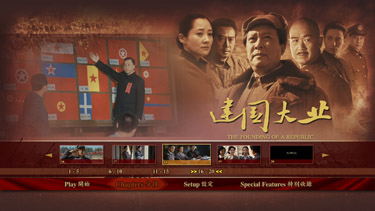 |
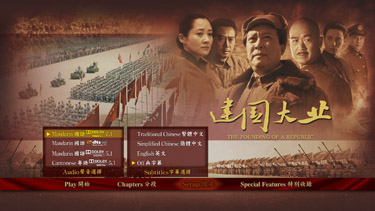 |
Bottom line:
6
The Founding of a Republic is not particularly satisfying as
a dramatic experience, though it serves as a condensed
history of one of China's many bloody chapters. I can't say
that I was always clear about the political developments as
expressed, but reactions to them are perfectly unambiguous.
My one complaint is that the narrative does not make clear –
to me, anyway, that the "founding of the republic" rightly
begins with Sun Yat Sun, and that the events depicted in the
story not only leave out the intervening fifteen years,
except for the most casual of summaries, but fail to make
the point that Mao did not so much establish the republic as
he consolidated competing political parties to one and, in
so doing, created a Second Republic. The high definition is
excellent, and audio, except for one slip at least, quite
good. Extra features are neither subtitled nor informative.
Leonard Norwitz
February 24th, 2010
![]()
![]()

![]()
![]()
![]()
![]()

![]()
![]()

